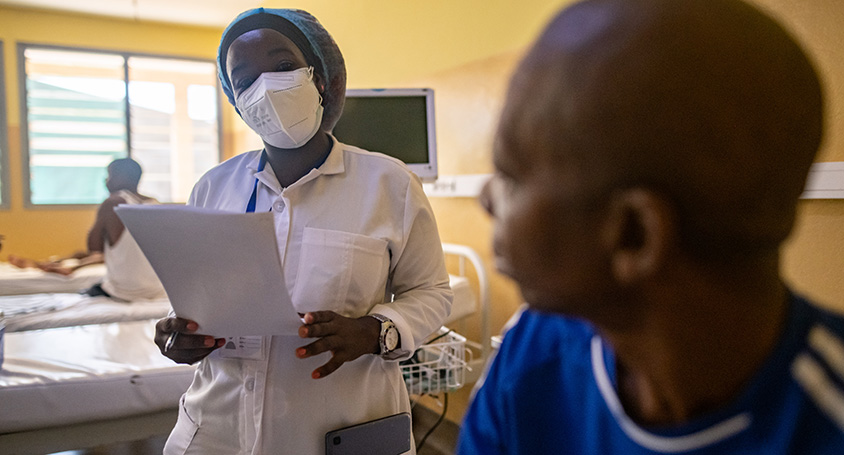Portable molecular testing brings life-saving TB diagnosis closer to communities in sub-Saharan Africa

The TB-CAPT CORE study has found that implementing rapid molecular tuberculosis (TB) testing at primary health care clinics in sub-Saharan Africa is feasible and significantly shortens the time to treatment initiation. Funded by the EDCTP2 programme and published in The Lancet Primary Care on 14 October 2025, the study provides the strongest evidence to date that decentralising molecular diagnostics—bringing testing directly to where patients first seek care—can transform TB control efforts in high-burden regions.
“We congratulate the TB-CAPT consortium on this important milestone. The TB-CAPT CORE study shows how pragmatic, real-world research can close the TB diagnostic gap by helping countries use existing tools more effectively to deliver life-saving testing where it’s most needed.”
Dr Debora Bade, Project Officer, EDCTP Association
The trial, conducted in Mozambique and Tanzania, evaluated the effectiveness of placing the Molbio Truenat MTB-Plus and RIF Dx assays—a portable, battery-operated molecular diagnostic platform endorsed by the World Health Organization (WHO) in 2020—directly at primary care facilities. These tools were compared to the current standard of care, which relies on off-site laboratory testing using the Xpert MTB/RIF Ultra platform.
Key findings of the study
- Feasibility in real-world settings: decentralised molecular TB testing and fast treatment initiation is feasible in high-burden settings
- Higher treatment initiation rates: Among patients with confirmed TB, 96.7% in clinics using Truenat started treatment within 7 days, compared to 63.3% under standard care.
- Same-day treatment initiation: In clinics using Truenat testing, 82.2% of patients with confirmed TB started treatment on the same day, compared with only 3.3% in clinics using standard off-site testing.
- The trial enrolled 4,034 adults with symptoms of pulmonary TB between August 2022 and June 2023, across 29 primary care clinics (15 intervention, 14 control).
These findings confirm that low-complexity, point-of-care molecular testing can dramatically improve the speed and accessibility of TB diagnosis and treatment in routine primary care.
The Truenat platform is designed for use in peripheral health settings, operating with minimal infrastructure and rechargeable batteries, making it well suited to expand access to high-quality TB testing in remote areas where laboratory capacity is limited.
About the TB-CAPT Project
The TB-CAPT (Capturing Impact of New TB Diagnostic Technologies) project is a large multi-country research consortium aimed at optimising the use of WHO-endorsed molecular TB diagnostics in sub-Saharan Africa.It includes three major studies, among them:
- TB-CAPT CORE: evaluating the Truenat platform at primary care level
- TB-CAPT XDR: assessing the feasibility and impact of the Xpert MTB/XDR assay within South Africa’s existing diagnostic infrastructure
- TB-CAPT EXULTANT HIV: evaluating the impact of expanded Ultra on GeneXpert testing for TB in people living with HIV admitted to hospital, who often have undiagnosed TB.
Together, these studies aim to generate practical, policy-relevant evidence to guide national TB programmes and global health stakeholders in accelerating progress toward ending TB.
Publication details
Khosa, Celso, et al. Implementing the Molbio Truenat platform and tuberculosis assays versus standard of care at primary care clinics for the detection and treatment of tuberculosis in Mozambique and Tanzania (TB-CAPT CORE): a cluster-randomised trial.
The Lancet Primary Care, Volume 0, Issue 0, 100028.
